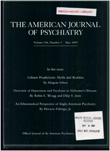Failure of urinary MHPG levels to predict treatment response in patients with unipolar depression
Abstract
The authors studied 64 depressed patients who were receiving a vanillylmandelic acid (VMA)-free diet and underwent a washout period (mean, 24 days) before treatment. During the washout period, a mean of 2.5 multiple 24-hour urinary 3-methoxy-4-hydroxyphenylglycol (MHPG) samples per patient were collected. Thirty-four patients were then treated with a "noradrenergic" antidepressant only (e.g., imipramine), and seven were treated with a "serotonergic" antidepressant only (e.g., amitriptyline). Twelve patients received combined drug treatment and 11 others spontaneously remitted. Response to treatment was rated on a clinical global evaluation scale from 1 (little or no response) to 7 (maximum response). No relationship was found between response to treatment, type of treatment, and the average pretreatment 24-hour urinary MHPG level. The authors thus failed to confirm the hypothesis that a low MHPG level predicts response to antidepressant treatment.
Access content
To read the fulltext, please use one of the options below to sign in or purchase access.- Personal login
- Institutional Login
- Sign in via OpenAthens
- Register for access
-
Please login/register if you wish to pair your device and check access availability.
Not a subscriber?
PsychiatryOnline subscription options offer access to the DSM-5 library, books, journals, CME, and patient resources. This all-in-one virtual library provides psychiatrists and mental health professionals with key resources for diagnosis, treatment, research, and professional development.
Need more help? PsychiatryOnline Customer Service may be reached by emailing [email protected] or by calling 800-368-5777 (in the U.S.) or 703-907-7322 (outside the U.S.).



